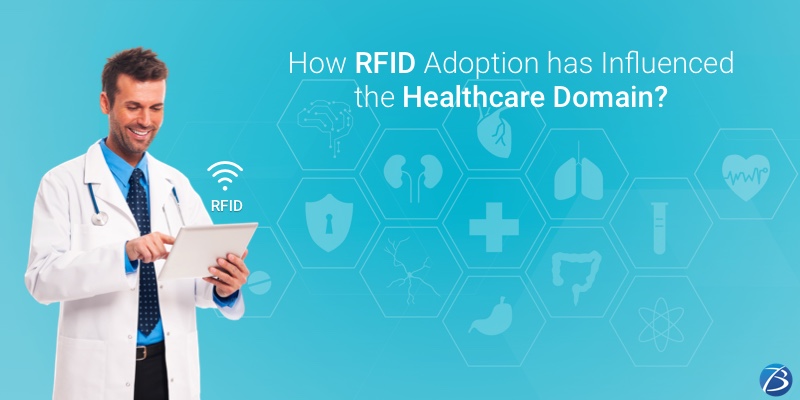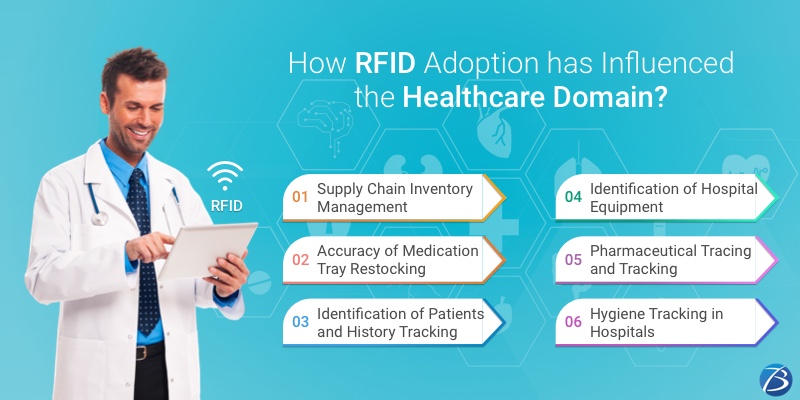How RFID Adoption has Influenced the Healthcare Domain?


Radio Frequency Identification (RFID) technology and its rising implementation in the healthcare domain has proved this technology to be a favorable asset to medical facilities and hospital bodies. The RFID technology offers promising benefits like real-time traceability, communication, identification, etc., thus, helping organizations to save vital time and money. Besides, the healthcare app development services leverage this technology to build advanced solutions that ensure patient and asset tracking, patient safety, enhanced quality of care, and more.
There is a lot to talk about how RFID is transforming the healthcare industry and in this post, we will provide insight on how healthcare app developers and healthcare companies can benefit from it.
Use Cases of RFID Technology in Healthcare

Supply Chain Inventory Management
RFID systems enable better inventory visibility, utilization, and accuracy in healthcare facilities. They reduce product expiration, wastage, and shrinkage to some extent. They help in reducing equipment and supply chain costs. Also, in some cases, certain RFID solutions like automatic inventory tracking systems decreased the time spent on searching and shipment of products to just 5 minutes, which used to be three hours if done manually.
Accuracy of Medication Tray Restocking
Using the RFID solutions, the time for daily medication tray restocking could be reduced by 15 minutes/tray.
Identification of Patients and History Tracking
RFID technology helps in patient identification when an RFID band is tied over the patient’s wrist. The band carries all the health data of the patients like their name, medical history, reports, allergy details, etc. This crucial data is useful to doctors while treating the patient.
Besides, RFID prevents wrong-site surgery, allows patient care auditing, provides automatic billing, and also decreases long wait times.
Identification of Hospital Equipment
In the operation theatres, there are several life-saving equipments used, and inspecting them is mandatory for avoiding any sudden breakdowns. In this case, too, RFID asset management systems prove beneficial as they monitor the equipment and inform the concerned personnel of its expiry.
RFID helps in completing the UDI requirements. Also, it helps to enhance CAUTI outcomes through automated asset tracking and avoid any additional purchase of equipment.
Pharmaceutical Tracing and Tracking
RFID solutions facilitate effective recall management. The RFID asset tracking and management systems can manage the drugs, other pharmaceuticals, and products like gloves, masks, syringes, etc. in hospitals by tracking the available stock and making the concerned person aware if there is any shortage. This also reduces the expiry and wastage of the products.
Hygiene Tracking in Hospitals
RFID solutions can be utilized for improving hygiene tracking practices in hospitals. These prevent hospital-acquired infections. This is so because continuous monitoring is quite an unrealistic approach when it comes to hand hygiene compliance. RFID-based continuous and real-time automatic hand hygiene recorders enable the medical facilities to record compliance that could lack when a direct observer is involved.
Some More Applications of RFID Innovation in Healthcare
- These systems also allow real-time tracking of the hospital staff dispersed across various patient care environments. This provides insightful information especially for larger and busier hospital bodies for tracking the overall productivity.
- RFID solutions allow the hospital to track the temperature of heat-sensitive medicines and drugs throughout the supply chain and take the essential steps for maintaining compliance and standards.
- RFID-based proximity cards provide a secure and seamless way for the staff or concerned personnel to access certain areas within the organization as they do not need to remember any PIN codes while entering the area. These cards do the job well.
- If RFID proximity cards are utilized along with an output management software, it can decrease the paper consumption and related costs to a great extent through secure input printing for your medical facility.
- RFID tags can also be used for tracking mobile assets in the hospitals like patient beds, wheelchairs, etc.
- RFID data can be stored online and it can be shared and managed online too. A battery-driven active RFID, like infrared and ultrasound, is equipped with the infrastructure that makes use of WiFi for communicating data to important medical systems like asset management apps, EMRs, etc.
A Few Drawbacks of RFID Tags and Systems in Healthcare
- For using an active RFID system in the hospital, the antennas and readers need to be installed throughout the hospital so that they could work in real-time. But this can be a bit tedious at times.
- Installation of active tags could be very expensive as a single active tag may cost up to $30. Comparatively, passive tags are less expensive.
- Passive RFID cannot track in real-time. So, the medical facilities should use them only when real-time tracking isn’t required.
- Active tags come in bigger sizes and need more maintenance because their batteries require to be changed often.
- Another drawback of an active tag is that it can operate only over WiFi. The tags that aren’t in the WiFi range will not be detected, won’t prove much useful for the hospital processes.
- Owing to the maintenance needs and high prices of active tags, they are usually employed only in costly mobile assets or complex patient processes like staff monitoring, infant security, etc.
Are You Interested in Building a Top-Class Website or Mobile App?
Final Verdict:
RFID technology comes with a huge potential to assist medical organizations, hospitals, clinics, pharmaceutical producers, biotechnology companies, etc. Besides this, the RFID innovation has opened new doors for enhanced operational efficiency, better security, and improved cost savings by tagging stocks, patient data, personnel records, and other assets.
However, despite providing so many advantages, the adoption of RFID technology has not yet taken up speed in the majority of healthcare facilities. As of now, these systems are being used in countries like the USA, Japan, UK, France, Spain, Italy, etc. But, this revolutionary technology needs to be implemented furthermore.
That’s it for now.
Hope it was insightful.
Please comment below to share your thoughts on the aforesaid topic.


